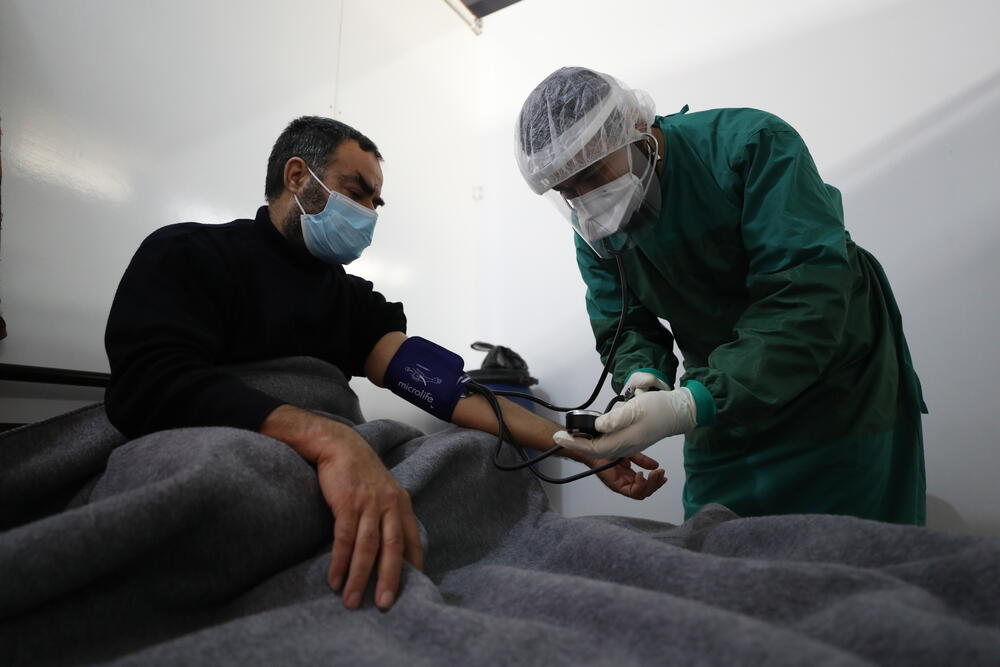Syria: Hospitals run out of supplies as second COVID-19 wave hits
The second wave of the COVID-19 pandemic has reached northeast Syria, hitting the healthcare system hard.
MSF teams working in the region have reported over 15,000 confirmed cases – including at least 960 among health workers – and 640 deaths as of 26 April.
However, the true numbers of people affected by COVID-19 is believed to be much higher than what is reported as people continue to struggle to access testing and treatment.
“It is shocking that one year into the outbreak, the region of northeast Syria still struggles to access essential COVID-19 supplies”
One year after the first case of coronavirus in the region, the response remains fragile and drastically underfunded, while plans for vaccinating frontline healthcare workers and the community remain vague.
Essential supplies
The current outbreak is spreading quickly through the whole of northeast Syria.
At the two COVID-19 hospitals that MSF supports, in Hassakeh and Raqqa, medical teams have seen a sharp increase in confirmed cases in the past month. And, with the rate of positive test results as high as 47 percent, it’s clear that many cases are going unidentified.
“It is shocking that one year into the outbreak, the region of northeast Syria still struggles to access essential COVID-19 supplies,” says Crystal Van Leeuwen, MSF’s medical emergency manager for Syria.
“There is a clear lack of laboratory testing, inadequate hospital capacity to manage patients, not enough oxygen to support those who need it most and limited availability of personal protective equipment (PPE) for health workers.”
The only lab in the region that can test for COVID-19 is in Qamishli. It is currently experiencing critical shortages and is expected to run out of supplies within two weeks without further help.

Help us prepare for the next emergency
MSF has donated testing supplies to the lab on four occasions since the start of the pandemic.
“With no UN cross-border mechanism in place for northeast Syria, creating challenges for supplies to reach the region from Damascus-based organisations – such as the World Health Organization – the region is woefully under-served in this outbreak”, says Van Leeuwen.
Raising the alarm
At least two COVID-19 treatment centres in Hassakeh and Raqqa have stopped activities after running out of funds and medical supplies. This has been linked to a lack of long-term funding and planning from humanitarian organisations as well as challenging supply lines.
Many other unsupported hospitals are now raising alarms and requesting basic but essential support for equipment like oxygen, antibiotics and PPE to cope with the increasing numbers of COVID-19 patients.
Our work in Syria: In numbers
1,134,400
OUTPATIENT CONSULTATIONS BY MSF IN SYRIA IN 2024
35,200
ROUTINE VACCINATIONS BY MSF IN SYRIA IN 2024
16,300
BIRTHS ASSISTED BY MSF IN SYRIA IN 2024
Missing vaccines
While many frontline health workers across the globe have received their first jab to protect them against COVID-19, vaccination plans in northeast Syria have fallen between the cracks due to vague promises and insufficient planning.
Local authorities report that they have been promised just 20,000 vaccines for an area that hosts five million people, and it remains unclear if those vaccines will even arrive.
“The COVID-19 response in northeast Syria is insufficient and people continue to unnecessarily die from this disease”
“With these minimal commitments and lack of clear planning, we are seriously concerned that significant COVID-19 vaccination activities are unlikely to take place in the region anytime soon,” says Van Leeuwen.
“The allocation of vaccine and other essential supplies has proven to be inequitable across the different regions of the country, showing that once again the humanitarian aid response in northeast Syria is being negatively impacted by regional politics and the lack of a UN cross-border mechanism.”
Unnecessary deaths
Many people in northeast Syria are already experiencing limited access to healthcare services, water and sanitation, making them especially vulnerable to this second wave of the pandemic.
In the COVID-19 treatment facilities supported by MSF, the mortality rates continue to rise as health services become more strained. With more than 70 percent of the patients admitted requiring oxygen, keeping up with the supply demands has not been possible.
“The COVID-19 response in northeast Syria is insufficient and people continue to unnecessarily die from this disease,” says Van Leeuwen.
“A significant increase in assistance from health and humanitarian organisations is essential, as is flexibility from donors to support organisations throughout the peaks and ebbs of this pandemic.
“With no foreseeable end to COVID-19 in Syria, vaccine provision and longer-term planning must be implemented in order to prevent further unnecessary suffering and to avoid sudden and disruptive shortages of essential supplies for prevention, testing and treatment.”
MSF in Syria
War has raged in Syria for the best part of a decade, killing hundreds of thousands of people, displacing millions more, and causing widespread destruction and suffering.
Civilian areas have been routinely bombed and deprived of assistance, and access to healthcare remains extremely poor in many areas.
Médecins Sans Frontières / Doctors Without Borders (MSF) operate in Syria where we can, but ongoing insecurity and access constraints severely limit our activities and hamper our ability to provide humanitarian assistance that matches the scale of the needs.
